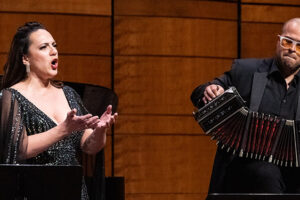

Cerquetti had one of the most remarkable, most brief careers in opera in the past century: she sang for a exactly one decade in dramatica d’agilita roles such as Norma, Aida, Abagaile in Nabucco (the role of her La Scala debut), Elena in I vespri siciliani, Elvira in Ernani, Elcia in Mosè in Egitto, and Matilde in Guglielmo Tell.
Despite a handful of broadcasts available since the LP era, she made only two studio recordings: the title role in La Gioconda and a recital album, both for Decca. “O Re dei Cieli” from the Italian version of Gaspare Spontini’s Agnes von Hohenstaufen on the recital disc is often regarded as one of the greatest recordings ever made. (There is a rumor that she began a recording of Norma which remains in fragments in Decca’s vaults.)
Cerquettti’s career was largely overshadowed by that of Callas; she often replaced her in the second cast of productions which the diva assoluta inaugurated. The reason for her early retirement was never clearly established: it has been attributed to her own physical health, the health of her mother, her marriage to baritone Edo Ferretti, and even to her mental health (one source reported that she spit on the steps of the church whenever she passed by).
Her career was centered in Italy, with only a few appearances in Mexico City and with the Lyric Opera of Chicago including Amelia in Un ballo in maschera opposite Jussi Björling under Tullio Serafin in 1955. Her final performance was in 1961 at the age of 30.
I met her once in the 1980s when she was a jury member of a Licia Albanese vocal competition at Alice Tully Hall along with Ebe Stignani and Irena Arkhipova. She spoke no English, but happily autographed the back cover of her recital LP (the unfortunate photo on the cover is notorious for showing a large woman with slightly frazzled hair and lipstick on her teeth).
She died from cardiovascular disease at 83 in 2014.
Corelli was by this time a well-known Pollione; he first sang the role opposite Callas in 1953 and joined her regularly through the end of her stage career. Pirazzini’s career is largely documented on recordings in secondary and comprimario roles, although she sang mezzo leads in Italy’s regional houses for 20 years; in this series of performances she replaced the ailing Ebe Stignani as Adalgisa. No obituary for her can be found on the Internet (including Italian Wikipedia) so she apparently turned 98 last August. This represents one of the last performances by Giulio Neri, who died at 48 from a heart attack three months after this series in the role of Oroveso.























Comments